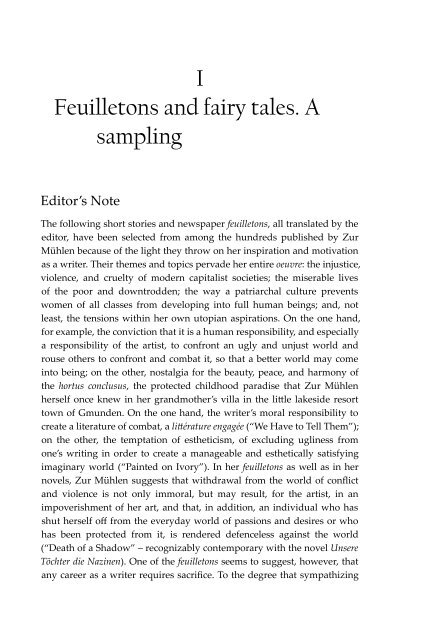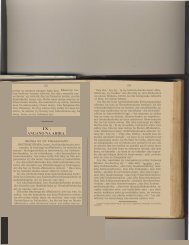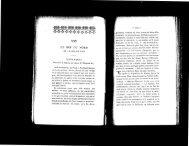The End and the Beginning - Open Book Publishers
The End and the Beginning - Open Book Publishers
The End and the Beginning - Open Book Publishers
You also want an ePaper? Increase the reach of your titles
YUMPU automatically turns print PDFs into web optimized ePapers that Google loves.
I<br />
Feuilletons <strong>and</strong> fairy tales. A<br />
sampling<br />
Editor’s Note<br />
<strong>The</strong> following short stories <strong>and</strong> newspaper feuilletons, all translated by <strong>the</strong><br />
editor, have been selected from among <strong>the</strong> hundreds published by Zur<br />
Mühlen because of <strong>the</strong> light <strong>the</strong>y throw on her inspiration <strong>and</strong> motivation<br />
as a writer. <strong>The</strong>ir <strong>the</strong>mes <strong>and</strong> topics pervade her entire oeuvre: <strong>the</strong> injustice,<br />
violence, <strong>and</strong> cruelty of modern capitalist societies; <strong>the</strong> miserable lives<br />
of <strong>the</strong> poor <strong>and</strong> downtrodden; <strong>the</strong> way a patriarchal culture prevents<br />
women of all classes from developing into full human beings; <strong>and</strong>, not<br />
least, <strong>the</strong> tensions within her own utopian aspirations. On <strong>the</strong> one h<strong>and</strong>,<br />
for example, <strong>the</strong> conviction that it is a human responsibility, <strong>and</strong> especially<br />
a responsibility of <strong>the</strong> artist, to confront an ugly <strong>and</strong> unjust world <strong>and</strong><br />
rouse o<strong>the</strong>rs to confront <strong>and</strong> combat it, so that a better world may come<br />
into being; on <strong>the</strong> o<strong>the</strong>r, nostalgia for <strong>the</strong> beauty, peace, <strong>and</strong> harmony of<br />
<strong>the</strong> hortus conclusus, <strong>the</strong> protected childhood paradise that Zur Mühlen<br />
herself once knew in her gr<strong>and</strong>mo<strong>the</strong>r’s villa in <strong>the</strong> little lakeside resort<br />
town of Gmunden. On <strong>the</strong> one h<strong>and</strong>, <strong>the</strong> writer’s moral responsibility to<br />
create a literature of combat, a littérature engagée (“We Have to Tell <strong>The</strong>m”);<br />
on <strong>the</strong> o<strong>the</strong>r, <strong>the</strong> temptation of es<strong>the</strong>ticism, of excluding ugliness from<br />
one’s writing in order to create a manageable <strong>and</strong> es<strong>the</strong>tically satisfying<br />
imaginary world (“Painted on Ivory”). In her feuilletons as well as in her<br />
novels, Zur Mühlen suggests that withdrawal from <strong>the</strong> world of conflict<br />
<strong>and</strong> violence is not only immoral, but may result, for <strong>the</strong> artist, in an<br />
impoverishment of her art, <strong>and</strong> that, in addition, an individual who has<br />
shut herself off from <strong>the</strong> everyday world of passions <strong>and</strong> desires or who<br />
has been protected from it, is rendered defenceless against <strong>the</strong> world<br />
(“Death of a Shadow” – recognizably contemporary with <strong>the</strong> novel Unsere<br />
Töchter die Nazinen). One of <strong>the</strong> feuilletons seems to suggest, however, that<br />
any career as a writer requires sacrifice. To <strong>the</strong> degree that sympathizing




